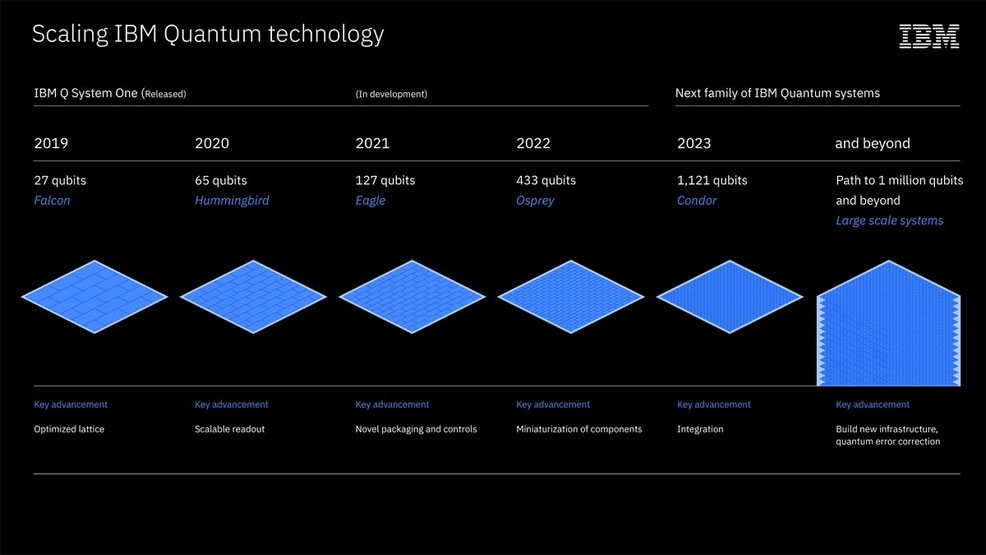
17th November 2021 IBM reveals 127-qubit quantum processor IBM has announced a new 127-quantum bit (qubit) processor – called 'Eagle' – at the IBM Quantum Summit 2021, its annual event to showcase milestones in quantum hardware and software.
This qubit count is a new world record, more than double that of Google's 53-qubit 'Sycamore' and the 60-qubit 'Zuchongzhi' superconducting processor from the University of Science and Technology of China (USTC) in Hefei. Unlike the binary "bits" of classical computers (each a simple "0" or "1"), qubits can represent multiple values simultaneously, by exploiting the strange properties of subatomic phenomena. This means that even small numbers of qubits will quickly grow to exponential number crunching abilities. However, arrays of qubits must be coherent, to isolate them from external stimuli. Low error rates are needed along with several other vital features, making the design of such processors technically very challenging. IBM recently published its detailed roadmaps for quantum computing, including a path for scaling hardware up to enable complex quantum circuits to reach Quantum Advantage, the point at which quantum systems can meaningfully outperform classical machines.
'Eagle' is the latest step along this scaling path and is IBM's first quantum processor to contain more than 100 operational and connected qubits. It follows IBM's 65-qubit 'Hummingbird' processor unveiled in 2020 and the 27-qubit 'Falcon' in 2019. To achieve this breakthrough, IBM researchers built on innovations pioneered within its existing quantum processors, such as a qubit arrangement designed to reduce errors and an architecture to reduce the number of necessary components. The new techniques within Eagle place control wiring on multiple physical levels within the processor, while keeping the qubits on a single layer, which enables a significant increase in qubits. The higher qubit count will allow users to explore problems at a new level of complexity when undertaking experiments and running applications – such as optimising machine learning, or modelling new molecules and materials for areas like the energy industry or drug discovery process. 'Eagle' will be the first IBM quantum processor whose scale makes it impossible for even the fastest classical supercomputer to replicate. According to IBM, the number of classical bits necessary to represent a state on the 127-qubit processor exceeds the total number of atoms in the more than 7.5 billion people alive today. "The arrival of the 'Eagle' processor is a major step towards the day when quantum computers can outperform classical computers for useful applications," said Dr. Darío Gil, Senior Vice President of IBM, and Director of Research. "Quantum computing has the power to transform nearly every sector and help us tackle the biggest problems of our time. This is why IBM continues to rapidly innovate quantum hardware and software design, building ways for quantum and classical workloads to empower each other, and create a global ecosystem that is imperative to the growth of a quantum industry." In addition to 'Eagle', IBM unveiled its next-generation hardware platform known as Quantum System Two. As processors continue to scale up, they are expected to mature beyond the infrastructure of Quantum System One. The updated version will be more flexible and modular than its predecessor, able to house and cool several processors in one system. Featuring higher-density cryogenic components and cabling, its novel structural design will optimise space inside the fridge to accommodate increased support hardware required by larger processors, while ensuring that engineers can easily access and service the interior. IBM plans to introduce Quantum System Two in 2023, by which time its 1,121-qubit 'Condor' processor will be ready. Quantum computers with millions of qubits are expected to be in commercial use during the 2030s.
Comments »
If you enjoyed this article, please consider sharing it:
|







